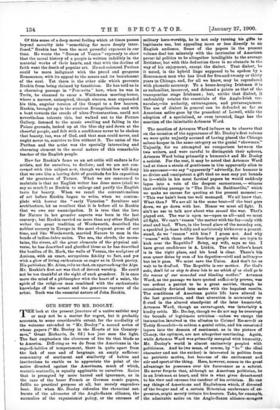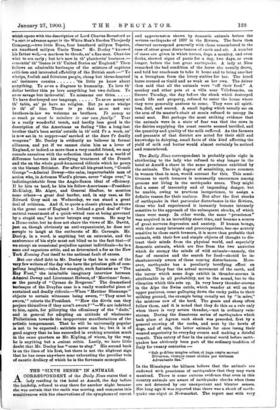OUR DEBT TO MR. DOOLEY.
THE lack at the present juncture of a native satirist may or may not be a matter for regret, but it probably accounts, to some considerable extent. for the cordiality of the welcome extended to " Mr. Dooley," a second series of whose papers (" Mr. Dooley in the Hearts of his Country- men," Grant Richards, 3s. 6d) has just seen the light. The fact emphasises the closeness of the tie that binds us to America. Differing as we do from the Americans in the superficialities of temperament, there is, quite apart from the link of race and of language, an amply sufficient community of sentiment and similarity of habits and institutions to enable us to appreciate the point of the satire directed against the Americans, much of which, mutatis mutandis, is equally applicable to ourselves. Satire that is prompted by mere hatred and ignorance, as in the case of the baser French or German comic papers, fulfils no practical purpose at all, but merely engenders heat. But when Mr. Dooley ridicules the rhetorical out- bursts of the advocates of the Anglo-Saxon alliance, the anomalies of the expansionist policy, or the excesses of
military hero-worship, he is not only turning his gifts to legitimate use, but appealing more or less directly to an English audience. Some of the papers in the present volume deal too minutely with the intricacies of American paroci ial politics to be altogether intelligible to the average Britisher, bat with this deduction there is no obstacle in the way of his enjoyment, except the dialect. That dialect, be it noted, is the hybrid lingo supposed to be spoken by a Roscommon man who has lived for five-and-twenty or thirty years in Chicago, and, for all we know, may be reproduced with phonetic accuracy. To a home-keeping Irishman it is as unfamiliar, incorrect, and debased a patois as that of the transpontine stage Irishman ; but, unlike that dialect, it undeniably retains the essentials of the Anglo-Irish ver. nacular,—its audacity, extravagance, and picturesqueness. The use of dialect in general can be defended so far as American satire goes by the precedent of Lowell, while the adoption of a specialised, or even invented, lingo has the sanction of the inimitable Artemus Ward.
The mention of Artemus Ward induces us to observe that on the occasion of the appearance of Mr. Dooley's first volume we were quite unjustly accused of having placed the Chicago saloon-keeper in the same category as the genial " showman." Unjustly, for we attempted no comparison between the two writers, and were careful to distinguish their spheres, Artemus Ward being primarily a humonriet and Mr. Dooley a satirist. For the rest, it may be noted that Artemus Ward had at times a strain of gentleness in him apparently alien to his successor—we say " apparently " advisedly, for humour is so divine and omnipotent a gift that no man may put bounds to it—while in his most farcical papers he would suddenly lapse into a vein of the deepest earnestness, — witness that striking passage in "The Draft in Baldinaville," which we make no excuse for quoting at the present moment:— " This war hain't been too well managed. We all know that. What then P We are all in the same boat—if the boat goes down, we go down with her. Hence we must all fight. It ain't no use to talk now about who caused the war. That's played out. The war is upon us—upon us all—and we must all fight. We can't • reason 'the matter with the foe—only with steel and lead. When, in the broad glare of the noonday sun, a speckled jackass boldly and maliciously kicks over a peanut- stand, do we `reason' with him ? I guess not. And why 'reason' with those other Southern people who are tryin to kick over the Republic? Betsy, my wife, says so too. I have great confidence in A. Linkin. The old fellow's heart is in the right place, and his head is clear. There's bin sum queer doins by sum of his deputies—civil and military— but let it pass. We must save the Union. And don't let us wait to be drafted. The Republic is our mother. For God's sake, don't let us stop to draw lots to see which of us shall go to the rescue of our wounded and bleeding mother." Artemus Ward, as the passage we have quoted sufficiently proves, was too ardent a patriot to be a great satirist, though he occasionally deviated into satire with the happiest results. The conditions of American public life have altered in the last generation, and that alteration is accurately re- fl-cted in the altered standpoint of the later humourist. Artemne Ward, though an extravagant, was invariably a kindly critic. Mr. Dooley, though we do not say he oversteps the bounds of legitimate criticism -unless we except the insinuation involved in the allusion to Colonel Roosevelt as Teddy Rosenfelt—is seldom a genial critic, and his occasional lapses into the domain of sentiment, as in the picture of Clancy, the optimist, are not altogether convincing. Again, while Artemus Ward was primarily occupied with humanity, Mr. Dooley's world is almost exclusively peopled with politicians. And he (we mean, of course, by " he " the ideal character and not the author) is interested in politics from no patriotic motive, but because of the excitement and stir and sport of the thing. Here, however, comes in the great advantage he possesses over his forerunner as a satirist. He never forgets that, although an American politician, he is an Irishman at heart, and this is what gives detachment to his view and excuses the candour of his criticism. He can say things of Americans and Englishmen which, if divested of the brogue and of a certain Hibernian exuberance of ex- pression, might merely irritate his hearers. Take, for example, the admirable satire on the Anglo-Saxon alliance-mongers
which opens with the description of Lord Charles Beresford as "a sort iv advance agent iv the White Man's Burden Thrajeedy Company,—two little Eves, four hnndberd millyon Topsies, six bundberd millyon Uncle Toms." Mr. Dooley " knowed his father well,—a markess be thrade, an' a fine man. Char-lee wint to sea early ; but he's now in th' plastherin' business.— cementin' th' liance iv th' United States an' England." Then follows an admirable burlesque of the mixture of captious criticism and interested affability of the British snob :—" Ye whelps, foolish and frivolous people, cheap but throe-hearted an' insincere cousins 'tie little ye know about annything. Ye ar-re a disgrace to humanity. Ye love th' dollar betther thin ye love annything but two dollars. Ye ar-re savage but inthrestin'. Ye misname our titles. . .
Ye have desthroyed our language. Ye ar-re mussy at th' table, an' ye have no religion. But ye ar-re whelps iv th' or line. Those iv ye that ar-re not our brothers-in-law we welcome as brothers. Ye annoy us so muck ye must be mimbers iv our own fanely." Teat is a really wonderful touch, and hardly less good is the description of the Americans as feeling "like a long-lost brother that's been settin' outside in th' cold f'r a week, an' is now ast in to supper—an' earched at the dure f'r deadly weapons." Mr. Dooley is evidently no believer in formal alliances, and yet if we cannot claim him as a lover of England, or indeed as more than a very candid friend, we may console ourselves with the reflection that there is a world of difference between his scarifying treatment of the French and the on the whole good-humoured ridicule which he pours on the blatant Britisher. For after all his great hero, "Cousin George "—Admiral Dewey—the calm, imperturbable man of action who, in Artemus Ward's phrase, never "slops over," is indistinguishable from the Anglo-Saxon ideal of efficiency. If he hits us hard, he hits his fellow-Americans—President McKinley, Mr. Alger, and General Shafter, to mention none others—a great deal harder, and, in any case, as Sir Edward Grey said on Wednesday, we can stand a great deal of criticism. And if, to quote a classic phrase, he shows in the great case of England v. Ireland a good deal of " the natural resentment of a quick-witted race at being governed by a stupid one," he never betrays any venom. He may be a Home-ruler, but he does not share the views of Mr. Devitt, just as, though obviously an anti-expansionist, he does not scruple to laugh at the outbursts of Mr. Carnegie. Mr. Dooley, in a word, is anything but an extremist, and the exuberance of his style must not blind us to the fact that—if WO except an occasional prejudice against individuals—he is a wane and sagacious critic, and as determined a foe as the New York Evening Post itself to the national fault of excess.
But our chief debt to Mr. Dooley is that he is one of the Very few writers of the day who have the priceless gift of com- pelling laughter,—take, for example, such fantasias as " The Hay Fleet," the inimitable imaginary interview between Admiral Dewey and Lieutenant Hobson, of `Merriman' fame, er the parody of " Cyrano de Bergerac." The dramatised burlesque of the Dreyfus case is a really wonderful piece of sustained and deadly ridicule.—When " Matther Blamange " objects to certain witnesses being sworn, " • They must be sworn,'" retorts the President. "' How the divine can they perjure thimsilves if they aren't sworn P' "—We are indebted to him, again, for pillorying the effeminacy of the "dude," and in general for adopting an attitude of wholesome Philistinism towards the inopportune manifestations of the artistic temperament. That he will be universally popular is not to be expected: satirists never can be; but it is of good augury that he has succeeded in evoking aversion much in the same quarters as Mr. Kipling, of whom, by the way, he is anything but a Lenient critic. Lastly, we have little doubt that Mr. Dooley has "come to stay." His second book is on the lines of his first, but there is not the Slightest sign that he has come anywhere near exhausting the peculiar vein of caustic drollery of which he is the fortunate monopolist.



















































 Previous page
Previous page